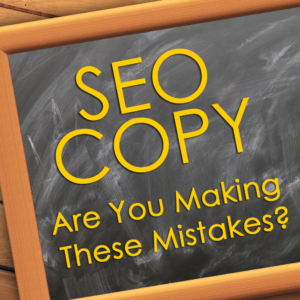 I look at SEO copy all day long. Copy, copy, copy. Client copy, competitor copy, blog copy, video copy, services page copy, SERPS snippet copy, bad copy, good copy, downright awful copy.
I look at SEO copy all day long. Copy, copy, copy. Client copy, competitor copy, blog copy, video copy, services page copy, SERPS snippet copy, bad copy, good copy, downright awful copy.
I know you’re jealous.
But honestly, this is actually one of my favorite things I do as a former-copywriter-turned-SEO-consultant.
So it’s obvious to me within seconds of reading what is “quality” copy and what is not. Also – what will be successful at ranking and what won’t.
Of course, this skill isn’t unique – hundreds of thousands of marketers and copywriters and SEOs evaluate copy every single day. But while most can sense what quality copy is, knowing vs applying is very different. Especially once you start adding in all the other SEO factors that can impact the rank of that copy.
And that brings me to today’s point – just because your copy reads beautifully and inspires action doesn’t mean the clicks will start rolling in from Google searches or that you’ll even show up in the SERPs. Because now, more than ever, SEO extends far beyond the words visible on the page.
Remember that quality copy must serve multiple purposes: rank in Google, provide a great user experience, and is valuable to readers. Is your copy meeting the mark across the board? What mistakes might you be making? Read on for a list of negative and positive ranking factors you should consider when looking at a page or site through your SEO lens.
Negative Ranking Factors:
Let’s start with how NOT to succeed today with modern SEO copywriting and on-page basics. Searchmetrics puts out a really interesting study every year about this:
Every year we analyze the top 30 search results for 10,000 keywords – that’s nearly 300,000 URLs – in our Ranking Factors study. We analyze them using a number of factors that we expand from year to year – e.g. the number of backlinks, text length and keyword & content features. The underlying question is always: What differentiates pages that have climbed the rankings, as opposed to those who are placed further back in the SERPs? Do they have more backlinks / text / keywords / etc.?
Here’s an overview of their findings about elements from pages that had a negative correlation with ranking:
- Number of unnatural inbound links
- Page is duplicate content
- Page content is thin
- Over-optimized anchor text
- Not mobile friendly
- Keyword stuffing
- Page links to spam
- Poor searcher satisfaction
- Slow page speed
- Total amount of advertising on the page
- Page assets (CSS/JS) blocked by robots.txt
- Non-mobile friendly
- Page contains duplicate title tag/meta description
Not too surprising, right?
Positive Search Factors
Now, let’s turn to Moz to look at their Search Engine Ranking Factors study.
According to Moz:
Every two years, Moz surveys the opinions of dozens of the world’s brightest search marketers and runs correlation studies to better understand the workings of search engine algorithms. We gather this data to gain insight into the factors that may help—or hurt—a website’s visibility in search engines.
According to Moz – here are the top 5 most influential broad search ranking factors:
- Domain-level links: quantity, quality, etc.
- Page-level links: trust, quantity, anchor text distribution, quality, etc.
- Page-level keyword & content-based features: content relevance, keyword usage, quality, quantity, etc.
- Page-level keyword features: content length, readability, uniqueness, page load speed, structured data, HTTPS, etc.
- Engagement and Traffic: SERP engagement, traffic/usage signals, etc.
This sounds easy, right? Well, as I like to say: it’s simple, but not easy. Especially for extremely busy marketers who face limited resources.
However – those who are able to effectively translate their knowledge into practice will come out winning every time.
SEO |